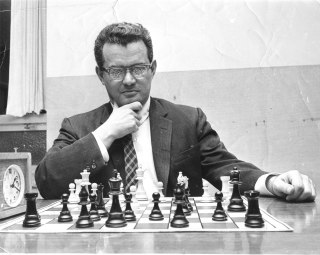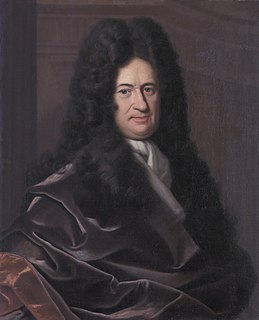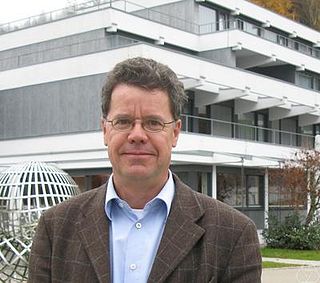In the philosophy of mathematics, intuitionism, or neointuitionism, is an approach where mathematics is considered to be purely the result of the constructive mental activity of humans rather than the discovery of fundamental principles claimed to exist in an objective reality. That is, logic and mathematics are not considered analytic activities wherein deep properties of objective reality are revealed and applied but are instead considered the application of internally consistent methods used to realize more complex mental constructs, regardless of their possible independent existence in an objective reality.
Mathematical logic is a subfield of mathematics exploring the applications of formal logic to mathematics. It bears close connections to metamathematics, the foundations of mathematics, and theoretical computer science. The unifying themes in mathematical logic include the study of the expressive power of formal systems and the deductive power of formal proof systems.
In the philosophy of mathematics, constructivism asserts that it is necessary to find a mathematical object to prove that it exists. In classical mathematics, one can prove the existence of a mathematical object without "finding" that object explicitly, by assuming its non-existence and then deriving a contradiction from that assumption. This proof by contradiction is not constructively valid. The constructive viewpoint involves a verificational interpretation of the existential quantifier, which is at odds with its classical interpretation.

In mathematics, infinitesimals are things so small that there is no way to measure them. The insight with exploiting infinitesimals was that entities could still retain certain specific properties, such as angle or slope, even though these entities were quantitatively small. The word infinitesimal comes from a 17th-century Modern Latin coinage infinitesimus, which originally referred to the "infinity-th" item in a sequence. Infinitesimals are a basic ingredient in the procedures of infinitesimal calculus as developed by Leibniz, including the law of continuity and the transcendental law of homogeneity. In common speech, an infinitesimal object is an object that is smaller than any feasible measurement, but not zero in size—or, so small that it cannot be distinguished from zero by any available means. Hence, when used as an adjective, "infinitesimal" means "extremely small". To give it a meaning, it usually must be compared to another infinitesimal object in the same context. Infinitely many infinitesimals are summed to produce an integral.
Foundations of mathematics is the study of the philosophical and logical and/or algorithmic basis of mathematics, or, in a broader sense, the mathematical investigation of what underlies the philosophical theories concerning the nature of mathematics. In this latter sense, the distinction between foundations of mathematics and philosophy of mathematics turns out to be quite vague. Foundations of mathematics can be conceived as the study of the basic mathematical concepts and how they form hierarchies of more complex structures and concepts, especially the fundamentally important structures that form the language of mathematics also called metamathematical concepts, with an eye to the philosophical aspects and the unity of mathematics. The search for foundations of mathematics is a central question of the philosophy of mathematics; the abstract nature of mathematical objects presents special philosophical challenges.
Proof theory is a major branch of mathematical logic that represents proofs as formal mathematical objects, facilitating their analysis by mathematical techniques. Proofs are typically presented as inductively-defined data structures such as plain lists, boxed lists, or trees, which are constructed according to the axioms and rules of inference of the logical system. As such, proof theory is syntactic in nature, in contrast to model theory, which is semantic in nature.
In mathematics, non-classical analysis is any system of analysis, other than classical real analysis, and complex, vector, tensor, etc., analysis based upon it.
In mathematical logic, in particular in model theory and non-standard analysis, an internal set is a set that is a member of a model.
Constructive set theory is an approach to mathematical constructivism following the program of axiomatic set theory. That is, it uses the usual first-order language of classical set theory. Although of course the logic is constructive, there is no explicit use of constructive types. Rather, there are just sets, thus it can look very much like classical mathematics done on the most common foundations, namely the Zermelo–Fraenkel axioms (ZFC).
The term differential is used in calculus to refer to an infinitesimal change in some varying quantity. For example, if x is a variable, then a change in the value of x is often denoted Δx. The differential dx represents an infinitely small change in the variable x. The idea of an infinitely small or infinitely slow change is extremely useful intuitively, and there are a number of ways to make the notion mathematically precise.
Non-standard analysis and its offshoot, non-standard calculus, have been criticized by several authors, notably Errett Bishop, Paul Halmos, and Alain Connes. These criticisms are analyzed below.
Elementary Calculus: An Infinitesimal approach is a textbook by H. Jerome Keisler. The subtitle alludes to the infinitesimal numbers of the hyperreal number system of Abraham Robinson and is sometimes given as An approach using infinitesimals. The book is available freely online and is currently published by Dover.
John Lane Bell is a Canadian philosopher and logician. He is Professor of Philosophy at the University of Western Ontario in Canada. He has made contributions to mathematical logic and philosophy, and is the author of a number of books. His research includes such topics as set theory, model theory, lattice theory, modal logic, quantum logic, constructive mathematics, type theory, topos theory, infinitesimal analysis, spacetime theory, and the philosophy of mathematics. He is the author of more than 70 articles and of 11 books. In 2009, he was elected a Fellow of the Royal Society of Canada.
In model theory, a discipline within mathematical logic, a non-standard model is a model of a theory that is not isomorphic to the intended model.

Albert Harold Lightstone (1926–1976) was a Canadian mathematician. He was one of the pioneers of non-standard analysis, a doctoral student of Abraham Robinson, and later a co-author with Robinson of the book Nonarchimedean Fields and Asymptotic Expansions.
This is a glossary of terms that are or have been considered areas of study in mathematics.





